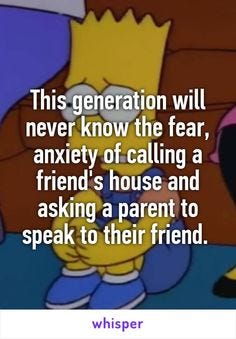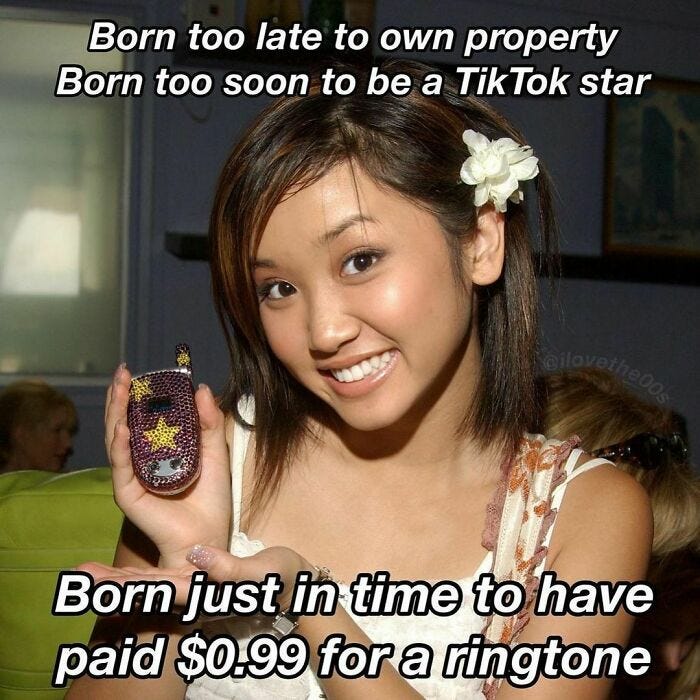'The Anxious Generation' & The Social Media Mental Illness Epidemic
On Jonathan Haidt's book about The Great Rewiring of childhood
During my two week Instagram detox over the holidays, I took the opportunity to be present with friends and family, take long runs through nature, and—for better or worse—read books about social media. The best book I read was Jonathan Haidt’s The Anxious Generation: How the Great Rewiring of Childhood Is Causing an Epidemic of Mental Illness. The Anxious Generation refers to the generation born after 1995, otherwise known as GenZ, which was the first to go through puberty with social media and smartphones. The result is not pretty.
Haidt’s book is full of charts showing a precipitous rise in anxiety, depression, and suicide attempts amongst teens (especially girls) that began around 2011-15. This rise has not corrected itself in subsequent years but continued to grow, establishing a frightening new normal. Haidt writes a compelling argument for why the relationship between social media and mental health is one of causation, not correlation—citing control studies which show that excessive use of social media is not merely a sympton of anxiety and depression; excessive use causes anxiety and depression.
I had intuited or heard second hand most of this information (read my earlier post about my Parent & Me instructor comparing social media/smartphones to cigarettes). So it was not the book’s graphs and charts that stirred me most. What moved me was Haidt’s advocation of a play-based childhood—one he fears parents, overly cautious of giving their kids too much freedom in the real world, have replaced with a phone-based childhood without any virtual-world guardrails.
Haidt defines a play-based childhood as one with an appropriate amount of independence and unsupervised free play with other kids. A childhood where recess is plentiful and upheld as the most important period of the day, and kids get bruises and experience conflict with other kids without adult interference. It is a childhood where curiosity is unfettered and robustness is learned alongside self-reliance, as kids become evermore anti fragile.
Reading this, I naturally asked myself: am I giving my daughter enough freedom? She is only two, but I could probably trust her to play in her room more without me present. Or climb certain playground structures without me hovering. I could not immediately intervene when another kid doesn’t want to share his snacks with her or vice versa. But perhaps the equally, if not more important, question is: am I giving my inner child enough freedom? Enough play? Enough chances to show that she is trustworthy, capable, and resilient? The answer, I knew, was no.
In my favorite chapter of the book, titled “Spiritual Elevation and Degradation,” Haidt takes off his social scientist hat to write “as a fellow human being who has felt overwhelmed, personally and perpetually, since around 2014.” He identifies six spiritual practices people can do to improve their well-being in this age of digital anxiety, including prayer and meditation, time in nature, and breaking bread with others on sacred days. This chapter ends with a section on “The God-Shaped Hole” in each of us, an adaptation Haidt believes is the result of multiple millenia of cultural and biological evolution. Regarding this hole and social media, he writes:
“There is a hole, an emptiness in us all, that we strive to fill. If it doesn’t get filled with something noble and elevated, modern society will quickly pump it full of garbage. That has been true since the beginning of the age of mass media, but the garbage got 100 times more powerful in the 2010s.”
Haidt’s sentences—true as they may be—can feel honked out and lacking in delicacy, as this one does. Nonetheless, reading The Anxious Generation, a book that connects the dots between the three issues I currently care most about—social media and mental health, spirituality, and motherhood—electrified me. It felt like a sign in the middle of the woods after days of hiking without a map. A sign that read “Keep going. More will be revealed.”
*Btw Haidt has a Substack called After Babel for those who are interested in learning more about the topics in his book.
**For fun, I’ve included some tech-related millenial memes below. Enjoy!















I am really grateful to you for recommending this book and for writing this important piece. Also, the memes at the end had me cringing and laughing in the best way ahahah
Sounds like a great read.